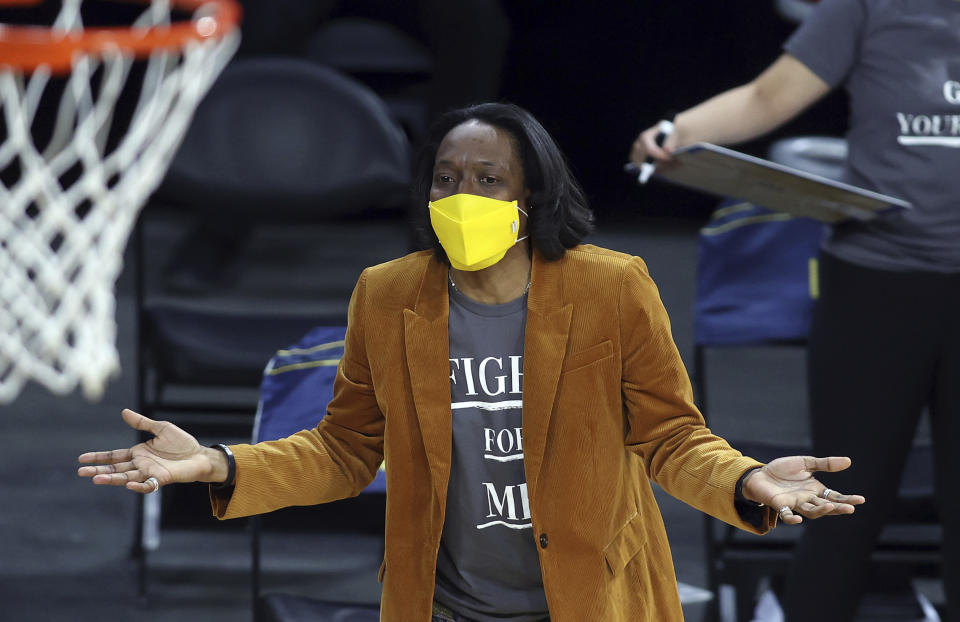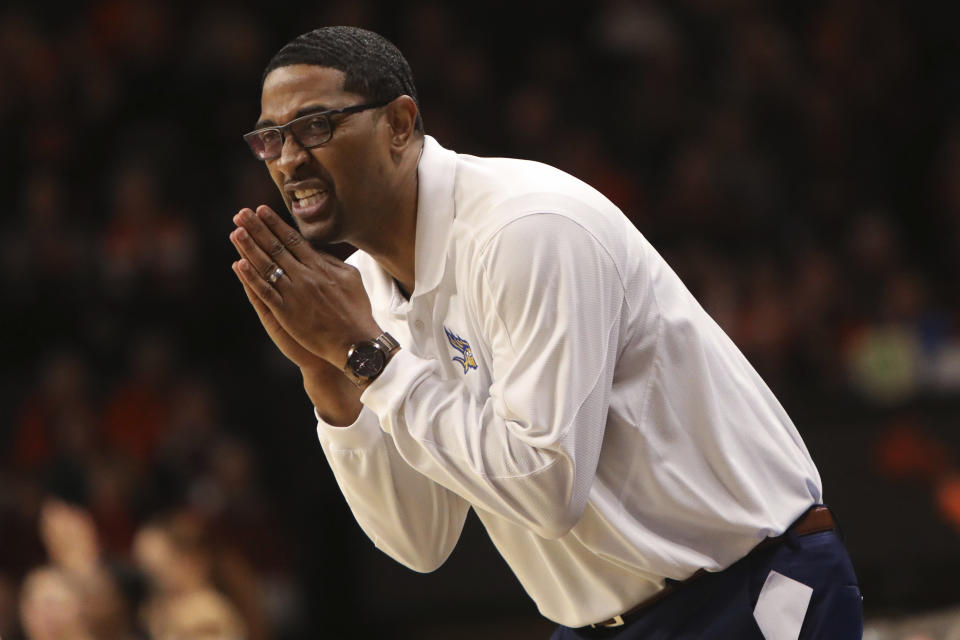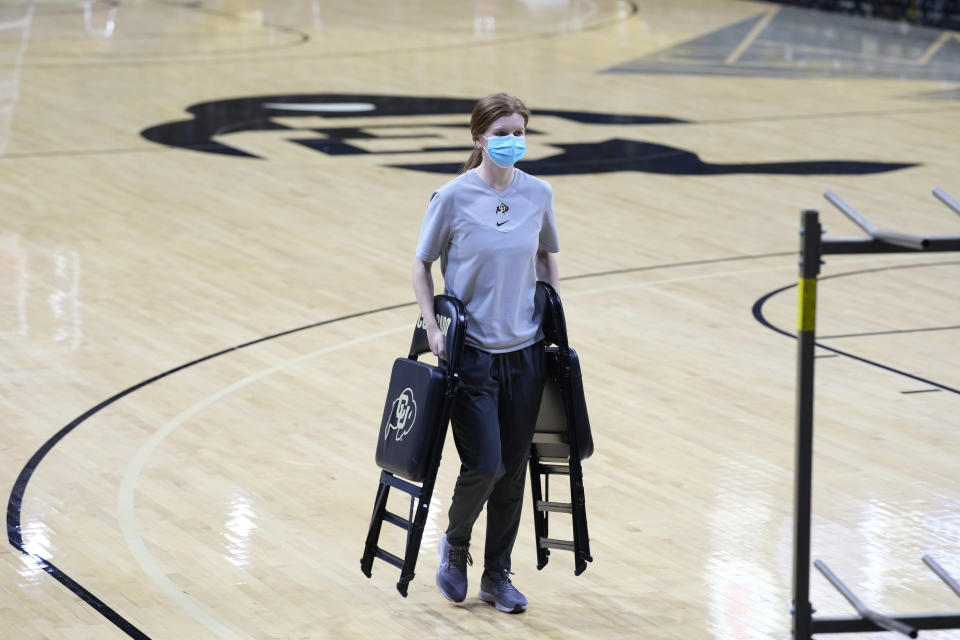COVID-19 toll more than physical for hard-hit hoops teams
Charmin Smith and her players figured they had gone through the worst of the pandemic in 2020-21.
COVID-19 precautions had forced the Cal's women's team to hold the first month of practices outdoors on a tennis court with portable baskets. Each player was required to have her own ball and was not allowed to pass it.
Nine games were postponed because of COVID outbreaks, on their team or the opponent, and they fell five games short of playing the regularly scheduled 18 Pac-12 games. They finished 1-16 overall.
“We were really hopeful things would be back to quote-unquote normal and we would be able to experience a season without disruption and get people back healthy," Smith said. "It hasn’t been the case.”
It hasn't been the case for a lot of teams. As of midweek in Division I, 420 men's games and 476 women's games had been postponed or canceled because of coronavirus outbreaks, according to Associated Press research, and COVID-19 has been ever-present even as the sport rolls toward tournament season.
The Cal women are among the hardest hit, having had seven Pac-12 games drop off their schedule because there wasn't enough time left to reschedule them. The Illinois women are playing their final eight regular-season games over 21 days due to rescheduling and will still fall four short of the standard 18 Big Ten games.
The Cal State Bakersfield women will be shorted six of their 18 Big West games. On the men's side, IUPUI will play only 17 of its 22 Horizon League games and Little Rock will play 14 of its 18 Sun Belt Conference games. Those three conferences declare missed games no-contests and don't make them up.
The stops and starts have created a cauldron of emotions for players amid greater concern over the mental health of athletes in general.
There is the disappointment of not being able to play. There's anger when players see other teams around the country able to play when they can't. There's anxiety from the uncertainty of not knowing when or if they'll play again. There's greater pressure to win because the margin for error increases as the number of conference games decreases. There's frustration for players coming out of a COVID layoff because they've lost their conditioning. There's added stress academically when rescheduled games come in rapid succession and there's more missed class time.
Coaches said they made themselves available to talk with players who were struggling with the disruptions, and players formed stronger bonds while leaning on each other.
“If you said there were no emotions to this, I would say it’s really an emotional drain, as it would be for any human being,” Illinois coach Nancy Fahey said.
Cal played its first 12 games as scheduled and won nine. Then came the first of three COVID pauses, two caused by positive tests among Cal personnel.
The Bears (12-10, 2-8 Pac-12) played just two games in January, had to cancel several practices and were short-handed for others. They've played seven straight games since coming out of their latest pause but will end up having played only 11 of its 18 Pac-12 games. The record will show 12 conference games, but one was a forfeit win.
“It’s late February, and if we had those extra games in January, we’d be a different team,” Smith said. “But I’m also proud of how we have pulled it together. We haven’t completely fallen apart and are making some progress.”
Illinois (6-17, 1-11 Big Ten) played only five games in 45 days over one stretch, had players coming and going from COVID isolation and couldn’t hold quality practices during the most important time of the season.
“We’re disappointed with the record,” Fahey said. “It’s hard to get any momentum going. Coaches don’t want to make excuses. We want to go out and play and compete, but it’s hard when you don’t have any rhythm to your season. We’ll live with it and do our best."
COVID pauses coupled with injuries hit the men's teams at Little Rock (8-17, 3-10) and IUPUI (3-23, 1-14).
Little Rock coach Darrell Walker said his team has used 15 or 16 different starting lineups and has missed 125 man games. For one game, seven players were out with injuries, and some of those available were just coming off a virus infection.
“You try to practice and guys get tired so fast you have to take breaks every three or four minutes,” Walker said. “My guys really had COVID. They had bad symptoms with it, so when they came back, it wasn’t good.”
COVID-19 hit IUPUI first-year coach Matt Crenshaw's team in the offseason, and the Jaguars didn't have enough healthy bodies to play five-on-five much of the summer. When a player tested positive during the season, teammates who were vaccinated but deemed to be close contacts were not allowed into athletic department facilities.
“So they're basically sitting at home for two weeks or 10 days,” Crenshaw said, “and then you expect them to go play.”
A run of injuries has left the Jaguars with only six healthy players since late January — the “Iron Six,” as Crenshaw calls them.
“They’re competitive, they’re actually playing the best basketball we’ve played. All the things you want, they’re giving it,” he said. “These are life lessons. That's what sports can do. They can help you with life lessons.”
For the Cal State Bakersfield women, it's been two years of hard lessons. The Roadrunners (4-16, 3-8) had three COVID pauses wipe out seven games last season. This season started with coach Greg McCall coming down with COVID-19 and missing two games. The first of the team's two pauses came before Christmas, and the Roadrunners had no basketball activity for 20 days and played three games in one 42-day stretch.
“I never expected us to get hit again with it, not with the magnitude it hit us," McCall said. "It really started last season. You thought this season would be different."
___
More AP college basketball: https://apnews.com/hub/college-basketball and https://apnews.com/hub/ap-top-25-college-basketball-poll and https://twitter.com/AP_Top25



